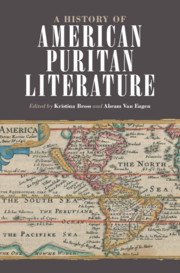Book contents
- A History of American Puritan Literature
- A History of American Puritan Literature
- Copyright page
- Dedication
- Contents
- Figures
- Contributors
- Acknowledgments
- Introduction
- Prologue
- Part I Places
- Part II Approaches
- Chapter 7 Theology
- Chapter 8 Aesthetics
- Chapter 9 Gender
- Chapter 10 Race
- Chapter 11 Print Culture
- Chapter 12 Ritual
- Chapter 13 Manuscript Culture
- Chapter 14 Environment
- Chapter 15 Science
- Chapter 16 Millennialism
- Chapter 17 Postsecularism
- Afterword
- Appendix
- Index
Chapter 16 - Millennialism
from Part II - Approaches
Published online by Cambridge University Press: 24 September 2020
- A History of American Puritan Literature
- A History of American Puritan Literature
- Copyright page
- Dedication
- Contents
- Figures
- Contributors
- Acknowledgments
- Introduction
- Prologue
- Part I Places
- Part II Approaches
- Chapter 7 Theology
- Chapter 8 Aesthetics
- Chapter 9 Gender
- Chapter 10 Race
- Chapter 11 Print Culture
- Chapter 12 Ritual
- Chapter 13 Manuscript Culture
- Chapter 14 Environment
- Chapter 15 Science
- Chapter 16 Millennialism
- Chapter 17 Postsecularism
- Afterword
- Appendix
- Index
Summary
Scholars have often cast puritans as doom-mongers fixated on an imminent and retributive apocalypse, but they were interested in the creation of the next world as well as in the destruction of this one. Writing about the millennium, the thousand-year reign of Christ’s saints prophesied in the book of Revelation, puritan authors evaluated the political and material means through which a new, improved earth could and would take shape. Since the Congregationalist church in New England did not have an official position on the subject, the writers discussed in this chapter (Cotton Mather, Thomas Prince, and Samuel Sewall) could use the millennium to explore the latest thinking about a broad range of topics, including the relationship between the soul and the body, the impact of the Fall on the planet’s orbit, and the geopolitics of global peace. Giving this speculative propensity its due corrects the modern tendency to see millennialism as an intellectual dead-end. While the authors in question believed that their predictions would (broadly) come true, their writings performed a function comparable to that fulfilled by the modern genre of science fiction: interrogating the limits of present-day life through visions of possible futures.
Keywords
- Type
- Chapter
- Information
- A History of American Puritan Literature , pp. 310 - 326Publisher: Cambridge University PressPrint publication year: 2020

